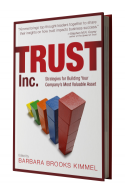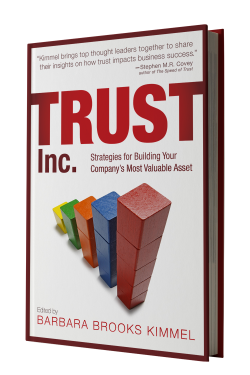BARBARA KIMMEL INTERVIEWS DEB MILLS-SCOFIELD
Barbara Kimmel: Deb – tell us a bit about your background, qualifications and expertise. If you have written a book, please provide the title.
Deb Mills-Scofield: I was raised to challenge and question the status quo. I went to Brown University and helped create the Cognitive Science concentration and went to Bell Labs after graduation where I received a patent for one of AT&T & Lucent’s largest revenue generating products. I have my own strategy and innovation consulting practice, am a partner in an early stage Venture Capital firm, teach a class on business model innovation at Oberlin College. I love spending time at Brown on the Engineering Advisory Council, as a Visiting Scholar mentoring students in entrepreneurship and social ventures, and guest lecturing. I also blog for Harvard Business Review. I’ve done a few startups that failed and succeeded and love working with young entrepreneurs to keep my business acumen nimble and open-minded.
Barbara Kimmel: Trust Across America’s mission is to rebuild trustworthy business behavior across the globe. How would you generally define trustworthy business behavior?
Deb Mills-Scofield: The golden rule is a great start – do unto others as you would have them do unto you, no matter what the situation. This means keeping commitments and promises, being accountable, acting with integrity, being vulnerable and humble, and understanding that having the right doesn’t make it right. It means always being able to look your customers and employees in the eye because you know you’ve done the right things.
Barbara Kimmel: In your opinion, what are some of the specific components of trustworthy business behavior?
Deb Mills-Scofield: Treating people (customers, employees, etc.) fairly, which isn’t always equally; taking the 2nd, 3rd etc. order consequences of your business’s operations and offerings into account in decision-making (for customers, employees, communities, environment); focusing on profit and money as outputs (means to an end) which enable outcomes (ends) of purpose and meaning; first truly understanding customers’ needs and circumstances before rushing to a solution. This starts with the people around you, your personal relationships with peers, bosses, those that work for you and goes on from there.
Barbara Kimmel: We all know that the erosion of corporate trust is a big problem. What are companies doing to combat this, and is it enough?
Deb Mills-Scofield: Companies are trying in various ways. A common way is compliance – which is obedience of the mind, not heart – to the letter of the law versus the spirit of the law. I think it has to start with leadership making themselves vulnerable, admitting they are wrong, that they need input and don’t know all the answers but know the direction. Leader need to trust their people: treat them like adults, reward, recognize, give autonomy and permission to try, fail and learn, let them create their own jobs and self-organize. And this is done in sincerity and authenticity towards the goal of freeing one’s people to delight customers instead of constantly checking to see if it improves the bottom line (outcome vs. output again).
Barbara Kimmel: Is the global “trust” climate improving or worsening? What actions will turn things around?
Deb Mills-Scofield: At a macro level, I think it is worsening. Even if it is getting better, there is a time lag before people will trust again. In my practice, admittedly self-selecting, I see a concerted effort to increase genuine trust and integrity within the organization and with customers and suppliers. The issue is having the tenacity to stick with while you’re building up credibility and a track record.
Barbara Kimmel: Can you provide a few examples of companies that are doing the “right” thing in your opinion? What steps are being taken by these companies that sets them apart?
Deb Mills-Scofield: There are the famous ones you hear about – Whole Foods, Zappos, etc. I know several ‘unknowns’ that are remarkable. One is Menasha Packaging, a 164yr old 6th generation family business over $1B that has to be one of the most incredible teams I’ve ever worked with in terms of compassions, integrity, honesty, transparency resulting in terrific profitability and growth. Their president, Mike Waite’s (who is joining me for the Feb 13th Trust Across America radio show) primary concern is making sure his people, at all levels, can live their dreams at home. The leadership lives up to their commitments, gives their people autonomy, allows failure, encourages self-organization and keeps a flat organization with a true open-door policy. The other company is Thogus, a 21st century manufacturing polymer and 3D printing company. Matt Hlavin, the president, makes sure he owns the culture – keeping it vibrant, open and transparent about his strengths and weaknesses. It truly does feel like a family.
Barbara Kimmel: Anything else you would like to add as a closing comment?
Deb Mills-Scofield: I’m a bit concerned that trust will become, if it hasn’t already, a buzzword. The issue and importance is that it has to come from within the person, from the heart. It should have only one real motive – it’s about ‘the other’, not about you. It shouldn’t be a way to achieve corporate growth, career advancement etc. It should be because you genuinely want to be trustworthy and that you want the best for your people, your customers, and your stakeholders. Anything less is not sustainable.
Barbara Kimmel: Deb, I share your concerns that a new industry of “trust-washing” will emerge, if it hasn’t already. I appreciate your insights and all you do to foster trustworthy business.
Deb Mills-Scofield can be reached at: dms@mills-scofield.com
Do you have questions or comments? Email Barbara@trustacrossamerica.com




Recent Comments